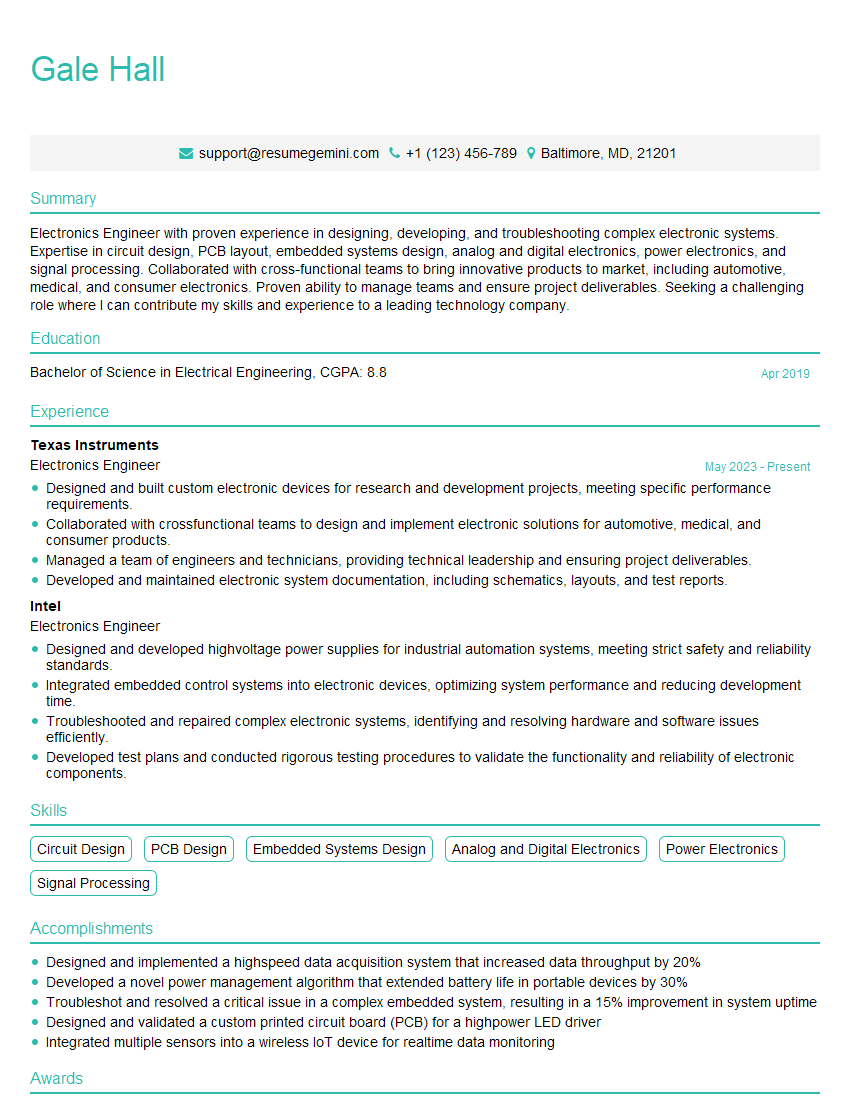Are you a seasoned Electronics Engineer seeking a new career path? Discover our professionally built Electronics Engineer Resume Template. This time-saving tool provides a solid foundation for your job search. Simply click “Edit Resume” to customize it with your unique experiences and achievements. Customize fonts and colors to match your personal style and increase your chances of landing your dream job. Explore more Resume Templates for additional options.

Gale Hall
Electronics Engineer
Summary
Electronics Engineer with proven experience in designing, developing, and troubleshooting complex electronic systems. Expertise in circuit design, PCB layout, embedded systems design, analog and digital electronics, power electronics, and signal processing. Collaborated with cross-functional teams to bring innovative products to market, including automotive, medical, and consumer electronics. Proven ability to manage teams and ensure project deliverables. Seeking a challenging role where I can contribute my skills and experience to a leading technology company.
Education
Bachelor of Science in Electrical Engineering
April 2019
Skills
- Circuit Design
- PCB Design
- Embedded Systems Design
- Analog and Digital Electronics
- Power Electronics
- Signal Processing
Work Experience
Electronics Engineer
- Designed and built custom electronic devices for research and development projects, meeting specific performance requirements.
- Collaborated with crossfunctional teams to design and implement electronic solutions for automotive, medical, and consumer products.
- Managed a team of engineers and technicians, providing technical leadership and ensuring project deliverables.
- Developed and maintained electronic system documentation, including schematics, layouts, and test reports.
Electronics Engineer
- Designed and developed highvoltage power supplies for industrial automation systems, meeting strict safety and reliability standards.
- Integrated embedded control systems into electronic devices, optimizing system performance and reducing development time.
- Troubleshooted and repaired complex electronic systems, identifying and resolving hardware and software issues efficiently.
- Developed test plans and conducted rigorous testing procedures to validate the functionality and reliability of electronic components.
Accomplishments
- Designed and implemented a highspeed data acquisition system that increased data throughput by 20%
- Developed a novel power management algorithm that extended battery life in portable devices by 30%
- Troubleshot and resolved a critical issue in a complex embedded system, resulting in a 15% improvement in system uptime
- Designed and validated a custom printed circuit board (PCB) for a highpower LED driver
- Integrated multiple sensors into a wireless IoT device for realtime data monitoring
Awards
- IEEE Outstanding Student Award for Excellence in Electronics Engineering
- First Place in the National Microelectronics Design Competition
- Recognized by NASA for Contributions to the James Webb Space Telescope Project
- Elected to the Institute of Electrical and Electronics Engineers (IEEE) Senior Member
Certificates
- Certified Electronics Engineer (CEE)
- Certified Embedded System Designer (CESD)
- Certified Analog Design Engineer (CADE)
- Certified Digital Design Engineer (CDDE)
Career Expert Tips:
- Select the ideal resume template to showcase your professional experience effectively.
- Master the art of resume writing to highlight your unique qualifications and achievements.
- Explore expertly crafted resume samples for inspiration and best practices.
- Build your best resume for free this new year with ResumeGemini. Enjoy exclusive discounts on ATS optimized resume templates.
How To Write Resume For Electronics Engineer
- Highlight your skills and experience in the resume summary and objective statement.
- Use keywords relevant to the job you are applying for.
- Quantify your accomplishments and provide specific examples of your work.
- Proofread your resume carefully for errors.
- Tailor your resume to each job you apply for.
Essential Experience Highlights for a Strong Electronics Engineer Resume
- Designed and developed high-voltage power supplies for industrial automation systems, meeting strict safety and reliability standards.
- Integrated embedded control systems into electronic devices, optimizing system performance and reducing development time.
- Troubleshooted and repaired complex electronic systems, identifying and resolving hardware and software issues efficiently.
- Developed test plans and conducted rigorous testing procedures to validate the functionality and reliability of electronic components.
- Designed and built custom electronic devices for research and development projects, meeting specific performance requirements.
- Collaborated with cross-functional teams to design and implement electronic solutions for automotive, medical, and consumer products.
- Managed a team of engineers and technicians, providing technical leadership and ensuring project deliverables.
Frequently Asked Questions (FAQ’s) For Electronics Engineer
What is the role of an Electronics Engineer?
Electronics Engineers design, develop, test, and maintain electronic devices and systems. They work in a variety of industries, including telecommunications, aerospace, automotive, and manufacturing.
What skills are required to be an Electronics Engineer?
Electronics Engineers need to have a strong understanding of electronics, including circuit design, digital logic, and signal processing. They also need to be familiar with software design and testing.
What is the job outlook for Electronics Engineers?
The job outlook for Electronics Engineers is expected to be good over the next few years. The increasing demand for electronic devices and systems is expected to lead to more job openings for Electronics Engineers.
What is the salary range for Electronics Engineers?
The salary range for Electronics Engineers varies depending on their experience and location. According to the U.S. Bureau of Labor Statistics, the median annual salary for Electronics Engineers was $100,240 in May 2020.
What are the career opportunities for Electronics Engineers?
Electronics Engineers can work in a variety of industries, including telecommunications, aerospace, automotive, and manufacturing. They can also work in research and development, or as technical consultants.